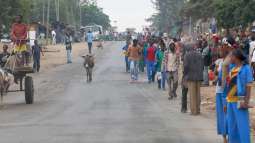ChelChele is a microregion of Yirgacheffe
Ethiopian Commodity Exchange (ECX)
The ECX was started in 2008 to help protect farmers from market forces that might prevent them from making a living. Most of the coffee in Ethiopia is produced by small-holders who own 0.7 hectares, bumper crops often lead to big price drops, which can make it unprofitable for farmers to harvest their coffee. What the ECX does is commoditize grains- including sesame, beans, maize, wheat, and most importantly, coffee. This ensures prompt payment to farmers. It also integrates all parts of the “eco-system” involved in a grains market, including warehousing, grading, trading, and payment. Access to information is emphasized, as farmers can obtain information about trading prices and local delivery points easily through dedicated telephone lines.
Here is a general rundown of how the ECX chain works in Ethiopia:
- Farmers deliver cherry to local wet mills. Some wet mills pay a premium for better quality cherry, some do not.
- The wet mill then delivers parchment coffee to a delivery station warehouse. In Yirgacheffe, this delivery station is in Dila.
- Coffees are labeled with a region and then are graded based both on physical qualities as well as cup quality. Higher quality coffee fetches a higher price.
- Coffee is categorized into 81 generic grades of coffee at the ECX: Processing: Washed, Un-washed, Region: Yirgacheffe, Sidama, Limu, etc. Flavor: A (Representative of region's cup characteristics) B (Less so), Grade: 1-9 (defect count)
- Tracibility on the coffee an exporter purchases coffee through the ECX will, at most, be labelled as “Yirgacheffe: Konga” or “Sidama: Borena.”
- Once a specific lot is purchased, it is then shipped to the buyer (typically an exporter in Ethiopia).
- Full lots come divided in 30 bag chop sub-lots (parchment). Exporters who are buying and selling many containers will cup through the sub-lots to select the top lots and build a full container from these.
While this system does ensure prompt payment and streamlines supply chain issues, it removes essentially all traceability from the coffee. This is problematic in the specialty world, where traceability is paramount.
The ECX does not allow for complete traceability, but coffee cooperatives in Ethiopia do have the ability to go around the ECX and export the coffee themselves. Coffees that are exported by a cooperative can have traceability, possibly even to a single farmer.


 |
Ethiopian Coffee Ceremony
|
Ethiopian Coffee Ceremony 